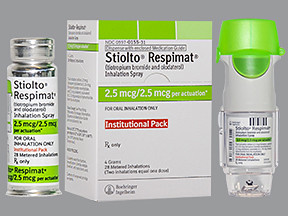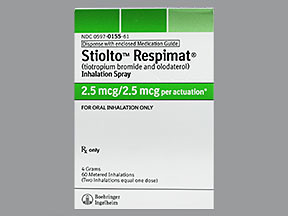TIOTROPIUM/OLODATEROL - INHALATION
PHONETIC PRONUNCIATION: (TYE-oh-TROE-pee-um/OH-loe-DA-ter-ol)
COMMON BRAND NAME(S): Stiolto Respimat
GENERIC NAME(S): tiotropium bromide/olodaterol HCl
Uses
USES: See also Warning section. This product is used to control and prevent symptoms (such as wheezing and shortness of breath) caused by ongoing lung disease (chronic obstructive pulmonary disease-COPD, which includes chronic bronchitis and emphysema). Controlling symptoms of breathing problems helps you stay active. This inhaler contains 2 medications: tiotropium and olodaterol. Both drugs work by relaxing the muscles around the airways in the lungs so they open up and make breathing easier. Tiotropium belongs to a class of drugs known as anticholinergics, and olodaterol is a LABA medication (see also Warning section). Both drugs are also known as bronchodilators. This medication must be used regularly to be effective. It does not work right away and should not be used to relieve sudden shortness of breath. If sudden breathing problems occur, use your quick-relief inhaler as prescribed.
How to use TIOTROPIUM/OLODATEROL - INHALATION
HOW TO USE: Read the Medication Guide and Instructions for Use provided by your pharmacist before you start using this medication and each time you get a refill. If you have any questions, ask your doctor or pharmacist. Follow the instructions for priming the inhaler if you are using it for the first time, or if you have not used it for more than 3 days, or for more than 21 days. When priming the inhaler, make sure to spray toward the ground (away from your face) so that you do not get the medication in your eyes. Inhale this medication by mouth as directed by your doctor, usually 2 puffs once daily. Wait at least 1 minute between each inhalation. If you are using other inhalers at the same time, wait at least one minute between the use of each medication. Use this medication regularly to get the most benefit from it. Use it at the same time each day. Do not use it more than one time each day. Do not increase your dose, use this medication more often, or stop using it without first consulting your doctor. Your condition will not improve any faster, and your risk of side effects will increase. Learn which of your inhalers you should use every day and which you should use if your breathing suddenly worsens (quick-relief drugs). Ask your doctor ahead of time what you should do if you have new or worsening cough or shortness of breath, wheezing, increased sputum, waking up at night with trouble breathing, if you use your quick-relief inhaler more often, or if your quick-relief inhaler does not seem to be working well. Learn when you can treat sudden breathing problems by yourself and when you must get medical help right away. If you have been using a quick-relief inhaler (albuterol, salbutamol) on a regular daily schedule (such as 4 times daily), your doctor will direct you to stop this schedule and only use the quick-relief inhaler as needed for sudden shortness of breath. Consult your doctor for details. Tell your doctor if your condition does not improve or if it worsens.
Side Effects
Precautions
Interactions
Overdose
Images
Reviews
Faq for TIOTROPIUM/OLODATEROL - INHALATION
Tiotropium/olodaterol inhalation is used to treat chronic obstructive pulmonary disease (COPD) including chronic bronchitis and emphysema.
Tiotropium/olodaterol inhalation works by relaxing and opening the airways, making it easier to breathe. Tiotropium acts as a bronchodilator, while olodaterol is a long-acting beta2-adrenergic agonist (LABA).
Common side effects of tiotropium/olodaterol inhalation may include dry mouth, sore throat, cough, headache, dizziness, and diarrhea.
Tiotropium/olodaterol inhalation should be used exactly as prescribed by your doctor. Typically, it is used once daily, and the inhaler should be held upright, with a deep breath inhaled after pressing the dose-release button.
Tiotropium/olodaterol inhalation may be used with other medications for COPD, but it is important to consult your doctor or pharmacist to ensure there are no potential drug interactions.
Tiotropium/olodaterol inhalation is not approved for the treatment of asthma. It is specifically indicated for use in COPD.
The effects of tiotropium/olodaterol inhalation can vary from person to person. However, many users may begin experiencing relief within 15 minutes of inhalation, with sustained improvement over time.
Yes, tiotropium/olodaterol inhalation is available as a generic medication. It is sold under the brand name Stiolto Respimat, but the generic version is also available.
Tiotropium/olodaterol inhalation is not approved for use in children. Its safety and effectiveness have not been established in this age group.
Tiotropium/olodaterol inhalation is a combination medication used to treat chronic obstructive pulmonary disease (COPD). It contains two active ingredients, tiotropium and olodaterol, which work together to improve lung function and ease breathing.
The recommended dosage of tiotropium/olodaterol inhalation is one inhalation (two puffs) once daily. It is important to follow the instructions provided by your healthcare provider or read the patient information leaflet for proper usage.
Common side effects of tiotropium/olodaterol inhalation may include dry mouth, throat irritation, cough, headache, and sinus infection. These side effects are usually mild and temporary. However, if you experience any severe or persistent side effects, it is important to contact your healthcare provider.
The safety of tiotropium/olodaterol inhalation in pregnancy and breastfeeding has not been well studied. It is important to consult with your healthcare provider before using this medication if you are pregnant or breastfeeding.
Tiotropium/olodaterol inhalation is not approved for use in children and adolescents below the age of 1
Certain medications, such as anticholinergic drugs, beta-blockers, and diuretics, may interact with tiotropium/olodaterol inhalation. It is important to inform your healthcare provider about all the medications and supplements you are taking to avoid any potential drug interactions.
Tiotropium/olodaterol inhalation should be stored at room temperature (between 68°F to 77°F or 20°C to 25°C) in a dry place. It should be kept away from direct sunlight, heat, and moisture. Always keep the inhaler cap on when not in use.
Warning
WARNING: One ingredient in this product is olodaterol. It belongs to a class of drugs known as long-acting beta agonists (LABAs). Rarely, people with asthma who use LABA medications have had serious (sometimes fatal) asthma-related breathing problems. Tiotropium/olodaterol is not approved to treat asthma.
Disclaimer
IMPORTANT: HOW TO USE THIS INFORMATION: This is a summary and does NOT have all possible information about this product. This information does not assure that this product is safe, effective, or appropriate for you. This information is not individual medical advice and does not substitute for the advice of your health care professional. Always ask your health care professional for complete information about this product and your specific health needs.


No Reviews Yet